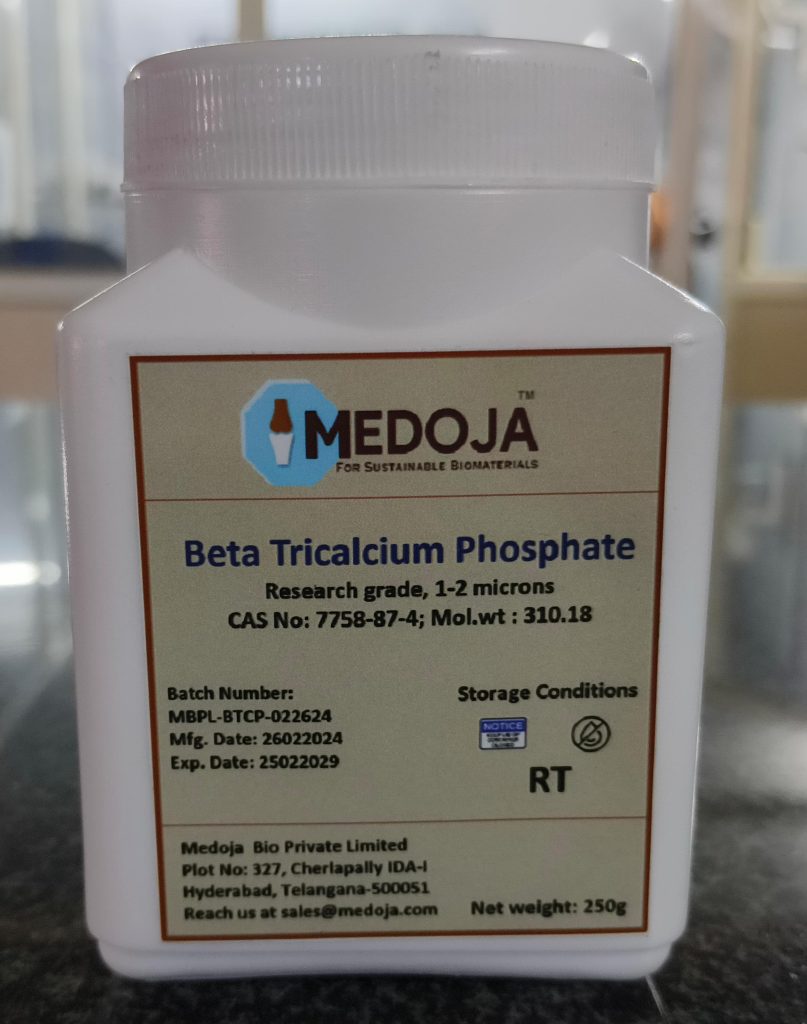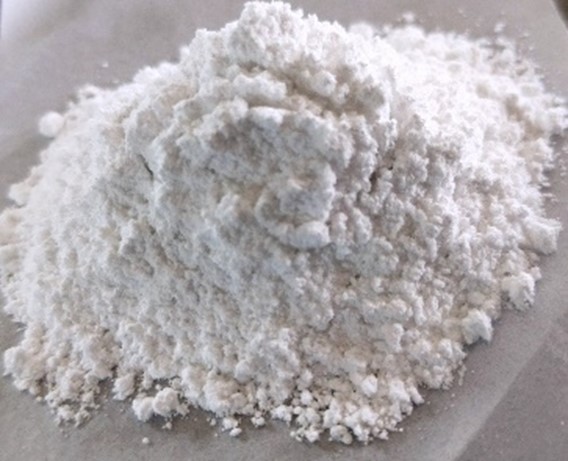

Minimum Order Quantity: 100g
| Attributes | Values |
|---|---|
| Purity | 95% |
| Manufacturer Name | Medoja Bio Private Limited |
| CAS NO. | 7758-87-4 |
| Molecular Weight | 310.18 g/mol |
| Grade | Medical |
| Chemical Formula | Ca3(PO4 )2 |
| Particle Size | 1-2 micrometres (Customizable) |
Beta-tricalcium phosphate (β-TCP) is a breakthrough biomaterial in bone regeneration. Its exceptional biocompatibility, osteoconductivity, and adjustable resorption make it an ideal substitute for natural bone minerals. β-TCP’s structure closely resembles that of natural bone, positioning it as a favored choice in orthopedics, dentistry, and maxillofacial surgery. Recognized as bone graft beta-TCP or simply as a “beta-TCP,” its versatility is transforming regenerative medicine.
β-TCP plays a crucial role in repairing large bone defects. It integrates smoothly with host tissue while gradually resorbing as new bone forms. In orthopedic applications, it is used to treat traumatic bone loss, tumor resection cavities, and non-union fractures. Research has shown that β-TCP can achieve significant bone regeneration. For example, in a sheep iliac defect model it produced 28.98% bone regeneration at eight weeks, outperforming untreated controls. Its porous design—with 60-80% porosity and optimal pore sizes above 300 μm—supports vascular growth and cell migration, ensuring efficient bone repair. When combined with hydroxyapatite (HA) powder or used in biphasic calcium phosphate (BCP) formulations, β-TCP for bone regeneration not only integrates with natural bone tissue but also stimulates stem cell differentiation through its high affinity for proteins like BMPs. It can be manufactured as granules, blocks, or putties, with high porosity that encourages vessel penetration and distribution.
In dentistry, β-TCP is gaining ground as a synthetic graft material. It is widely used for socket preservation, sinus augmentation, and periodontal regeneration. In socket preservation, pure β-TCP maintains the volume of the alveolar ridge after tooth extraction, providing a solid foundation for future implant placement and reducing infection risks. In sinus augmentation, β-TCP-based grafts yield substantial vertical bone gain and promote faster vascularization compared to xenografts. For periodontal regeneration, β-TCP membranes demonstrate superior clinical attachment gains over traditional collagen barriers, thanks to their sustained release of calcium ions, which boost BMP-2 expression.
When combined with stem cells, β-TCP offers both structural support and enhanced biological activity. Scaffolds seeded with bone marrow-derived or adipose-derived stem cells have shown improved union rates and increased bone volume. Exosome-functionalized β-TCP further accelerates angiogenesis compared to growth factor-loaded grafts. However, early healing may sometimes be delayed due to rapid calcium ion release, and careful control over particle size is needed to prevent migration in sinus graft applications.
Recent advancements in material engineering have expanded the capabilities of β-TCP. Three-dimensional printing now enables the fabrication of patient-specific scaffolds with controlled pore gradients. For instance, 50% PCL-50% β-TCP cages have outperformed traditional titanium in spinal fusion models, achieving 85% trabecular bone infill at twelve weeks. Silver nanoparticle coatings on β-TCP reduce bacterial biofilm formation while maintaining biocompatibility. Emerging innovations like 4D-printed β-TCP scaffolds with shape-memory polymers promise minimally invasive deployment and targeted drug release. Future developments include smart scaffolds with embedded sensors for real-time healing monitoring and gene-activated matrices for localized growth factor production, paving the way for β-TCP to become the new benchmark in bone regeneration.
The diverse applications of β-TCP span a wide array of medical specialties. Its ability to support robust bone growth while gradually resorbing makes it an outstanding material for treating bone defects. Coupled with advanced technologies and biological enhancements, β-TCP is at the forefront of bone repair and regeneration. As ongoing research refines its use, β-TCP is set to play an even more vital role in advancing patient care and delivering innovative, effective treatments for complex bone injuries and diseases.